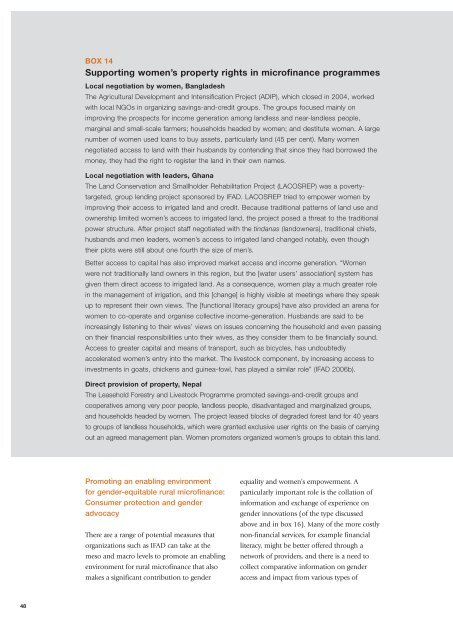Reaching and empowering women - Genfinance
Reaching and empowering women - Genfinance
Reaching and empowering women - Genfinance
Create successful ePaper yourself
Turn your PDF publications into a flip-book with our unique Google optimized e-Paper software.
BOX 14<br />
Supporting <strong>women</strong>’s property rights in microfinance programmes<br />
Local negotiation by <strong>women</strong>, Bangladesh<br />
The Agricultural Development <strong>and</strong> Intensification Project (ADIP), which closed in 2004, worked<br />
with local NGOs in organizing savings-<strong>and</strong>-credit groups. The groups focused mainly on<br />
improving the prospects for income generation among l<strong>and</strong>less <strong>and</strong> near-l<strong>and</strong>less people,<br />
marginal <strong>and</strong> small-scale farmers; households headed by <strong>women</strong>; <strong>and</strong> destitute <strong>women</strong>. A large<br />
number of <strong>women</strong> used loans to buy assets, particularly l<strong>and</strong> (45 per cent). Many <strong>women</strong><br />
negotiated access to l<strong>and</strong> with their husb<strong>and</strong>s by contending that since they had borrowed the<br />
money, they had the right to register the l<strong>and</strong> in their own names.<br />
Local negotiation with leaders, Ghana<br />
The L<strong>and</strong> Conservation <strong>and</strong> Smallholder Rehabilitation Project (LACOSREP) was a povertytargeted,<br />
group lending project sponsored by IFAD. LACOSREP tried to empower <strong>women</strong> by<br />
improving their access to irrigated l<strong>and</strong> <strong>and</strong> credit. Because traditional patterns of l<strong>and</strong> use <strong>and</strong><br />
ownership limited <strong>women</strong>’s access to irrigated l<strong>and</strong>, the project posed a threat to the traditional<br />
power structure. After project staff negotiated with the tindanas (l<strong>and</strong>owners), traditional chiefs,<br />
husb<strong>and</strong>s <strong>and</strong> men leaders, <strong>women</strong>’s access to irrigated l<strong>and</strong> changed notably, even though<br />
their plots were still about one fourth the size of men’s.<br />
Better access to capital has also improved market access <strong>and</strong> income generation. “Women<br />
were not traditionally l<strong>and</strong> owners in this region, but the [water users’ association] system has<br />
given them direct access to irrigated l<strong>and</strong>. As a consequence, <strong>women</strong> play a much greater role<br />
in the management of irrigation, <strong>and</strong> this [change] is highly visible at meetings where they speak<br />
up to represent their own views. The [functional literacy groups] have also provided an arena for<br />
<strong>women</strong> to co-operate <strong>and</strong> organise collective income-generation. Husb<strong>and</strong>s are said to be<br />
increasingly listening to their wives’ views on issues concerning the household <strong>and</strong> even passing<br />
on their financial responsibilities unto their wives, as they consider them to be financially sound.<br />
Access to greater capital <strong>and</strong> means of transport, such as bicycles, has undoubtedly<br />
accelerated <strong>women</strong>’s entry into the market. The livestock component, by increasing access to<br />
investments in goats, chickens <strong>and</strong> guinea-fowl, has played a similar role” (IFAD 2006b).<br />
Direct provision of property, Nepal<br />
The Leasehold Forestry <strong>and</strong> Livestock Programme promoted savings-<strong>and</strong>-credit groups <strong>and</strong><br />
cooperatives among very poor people, l<strong>and</strong>less people, disadvantaged <strong>and</strong> marginalized groups,<br />
<strong>and</strong> households headed by <strong>women</strong>. The project leased blocks of degraded forest l<strong>and</strong> for 40 years<br />
to groups of l<strong>and</strong>less households, which were granted exclusive user rights on the basis of carrying<br />
out an agreed management plan. Women promoters organized <strong>women</strong>’s groups to obtain this l<strong>and</strong>.<br />
Promoting an enabling environment<br />
for gender-equitable rural microfinance:<br />
Consumer protection <strong>and</strong> gender<br />
advocacy<br />
There are a range of potential measures that<br />
organizations such as IFAD can take at the<br />
meso <strong>and</strong> macro levels to promote an enabling<br />
environment for rural microfinance that also<br />
makes a significant contribution to gender<br />
equality <strong>and</strong> <strong>women</strong>’s empowerment. A<br />
particularly important role is the collation of<br />
information <strong>and</strong> exchange of experience on<br />
gender innovations (of the type discussed<br />
above <strong>and</strong> in box 16). Many of the more costly<br />
non-financial services, for example financial<br />
literacy, might be better offered through a<br />
network of providers, <strong>and</strong> there is a need to<br />
collect comparative information on gender<br />
access <strong>and</strong> impact from various types of<br />
48

















